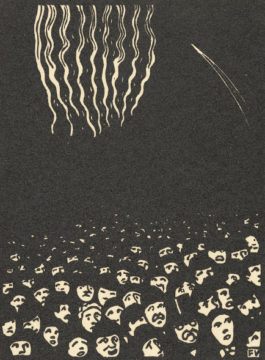Katy Waldman in The New Yorker:
 In “The Voice in Your Head,” a darkly comic short film by the writer-director Graham Parkes, a man wakes up every morning to find a fit, hipsterish dope perched next to his bed. “Good morning, fucko,” the dope says. “Ready for another disappointing day?” The camera follows the pair from the shower (“Your penis is very small”) to the car (“You know your dad hates you”) and then to work, where the dope, wearing a pin-striped olive jacket and gold chain, keeps the bit going through lunchtime. (“Eat normal.”) He’s a nuisance, a torment, and not especially original—the kind of bargain-bin hater that makes all the rest of us critics look bad.
In “The Voice in Your Head,” a darkly comic short film by the writer-director Graham Parkes, a man wakes up every morning to find a fit, hipsterish dope perched next to his bed. “Good morning, fucko,” the dope says. “Ready for another disappointing day?” The camera follows the pair from the shower (“Your penis is very small”) to the car (“You know your dad hates you”) and then to work, where the dope, wearing a pin-striped olive jacket and gold chain, keeps the bit going through lunchtime. (“Eat normal.”) He’s a nuisance, a torment, and not especially original—the kind of bargain-bin hater that makes all the rest of us critics look bad.
This dope, or some form of him, is also the subject of “Chatter,” a new book by the experimental psychologist Ethan Kross. (The book’s subtitle—“The Voice in Our Head, Why It Matters, and How to Harness It”—reflects a slightly warmer attitude toward our inner cynic, who can also, Kross suggests, become our “best coach.”) It’s an irresistible thought experiment: What does yours look like? A drill sergeant? A languidly bored crush? Kross, who studies the “science of introspection” at the University of Michigan’s Emotion & Self-Control Lab, which he founded, aims to produce a different sort of portrait, one pieced together from MRI scans and clinical observations.
“Chatter,” which spends a lot of time examining high-drama conversations that go nowhere, arrives as hundreds of millions of people broadcast their innermost thoughts (or what they’d like us to believe are their innermost thoughts) on social media every day. But Kross argues that self-talk has long been a part of humanity’s basic architecture. “We are perpetually slipping away from the present into the parallel, nonlinear world of our minds,” he writes; our “default state” is a rich zone of remembrance, musing, projection. This is a quiet rejoinder to New Age wisdom—people are simply not designed to “live in the moment”—and the first part of “Chatter” grounds its argument in research about the brain. Kross reports that mental descants are part of the phonological loop, the element of working memory that transcribes “everything related to words that occurs around us in the present.” (In addition to an inner voice, there is also an inner ear.) The loop guides our attention; the voice, specifically, evaluates us “as we strive for goals,” popping up to assess our progress “like an appointment reminder appearing on your lock screen.” Using this voice, Kross writes, we can run mental simulations, rehearsing possible responses to a co-worker’s question or a partner’s complaint; we can also construct “meaningful narratives through autobiographical reasoning”—telling ourselves stories, as Didion put it, in order to live.
More here.
 In his biggest policy announcement, he said the US government would end support for offensive operations in Yemen. That’s an important step, given the Saudi-led coalition’s disturbing pattern of using US precision weapons and intelligence to hit Yemeni civilian targets such as markets, funerals, and even a school bus. Trump closed his eyes to all that in the name of (illusory) US jobs. Biden rightfully will have nothing to do with it.
In his biggest policy announcement, he said the US government would end support for offensive operations in Yemen. That’s an important step, given the Saudi-led coalition’s disturbing pattern of using US precision weapons and intelligence to hit Yemeni civilian targets such as markets, funerals, and even a school bus. Trump closed his eyes to all that in the name of (illusory) US jobs. Biden rightfully will have nothing to do with it.

 In “The Voice in Your Head,” a darkly comic short film by the writer-director Graham Parkes, a man wakes up every morning to find a fit, hipsterish dope perched next to his bed. “Good morning, fucko,” the dope says. “Ready for another disappointing day?” The camera follows the pair from the shower (“Your penis is very small”) to the car (“You know your dad hates you”) and then to work, where the dope, wearing a pin-striped olive jacket and gold chain, keeps the bit going through lunchtime. (“Eat normal.”) He’s a nuisance, a torment, and not especially original—the kind of bargain-bin hater that makes all the rest of us critics look bad.
In “The Voice in Your Head,” a darkly comic short film by the writer-director Graham Parkes, a man wakes up every morning to find a fit, hipsterish dope perched next to his bed. “Good morning, fucko,” the dope says. “Ready for another disappointing day?” The camera follows the pair from the shower (“Your penis is very small”) to the car (“You know your dad hates you”) and then to work, where the dope, wearing a pin-striped olive jacket and gold chain, keeps the bit going through lunchtime. (“Eat normal.”) He’s a nuisance, a torment, and not especially original—the kind of bargain-bin hater that makes all the rest of us critics look bad. When it comes to pioneers in African American history,
When it comes to pioneers in African American history,  Eric Levitz in NY Magazine:
Eric Levitz in NY Magazine: Virginia Jackson and Meredith Martin in Avidly:
Virginia Jackson and Meredith Martin in Avidly: Jessica Boyall in Sidecar:
Jessica Boyall in Sidecar: Phenomenal World has releases its first collection
Phenomenal World has releases its first collection  Ian Balfour reviews The Benjamin Files by Fredric Jameson, in the LA Review of Books:
Ian Balfour reviews The Benjamin Files by Fredric Jameson, in the LA Review of Books: If I had stepped onstage at a metal concert in the late ’80s and announced to the audience that in the future they would be listening to all-synthesizer metal albums, I’d have had enough beer thrown at me to turn in my outfit for a bottle deposit. The metal and noise genres are reputed to be intrinsically rigid, but that’s what makes them so fun, so compelling and infuriating. Nowhere is this more evident than when surveying the totality of Aaron Turner’s work as an artist, musician, and founder of the heavy, influential, and (mostly) defunct label Hydra Head Records. Turner’s present band SUMAC—since its inception on a nonstop tear of activity, including a recent collaboration with Keiji Haino—just released May You Be Held, the latest planet on their horizon of metal.
If I had stepped onstage at a metal concert in the late ’80s and announced to the audience that in the future they would be listening to all-synthesizer metal albums, I’d have had enough beer thrown at me to turn in my outfit for a bottle deposit. The metal and noise genres are reputed to be intrinsically rigid, but that’s what makes them so fun, so compelling and infuriating. Nowhere is this more evident than when surveying the totality of Aaron Turner’s work as an artist, musician, and founder of the heavy, influential, and (mostly) defunct label Hydra Head Records. Turner’s present band SUMAC—since its inception on a nonstop tear of activity, including a recent collaboration with Keiji Haino—just released May You Be Held, the latest planet on their horizon of metal. In brief, the circumstances were these: Heine, a master of caustic wit and raw heartbreak, was in his early thirties and had found fame with his “Buch der Lieder” (“Book of Songs”), a collection of outwardly Romantic lyric poems with an ironic undertow that often escaped early readers. Platen bore a noble name—Count Platen-Hallermünde—but had grown up without financial advantages, serving in the military before turning to literature. He had won notice for finespun odes, sonnets, and adaptations of the Persian ghazal. Karl Immermann, a friend of Heine’s, had made cracks about pretentious poets who “vomit Ghaselen”; Heine quoted Immermann’s lines in one of his volumes of “Reisebilder” (“
In brief, the circumstances were these: Heine, a master of caustic wit and raw heartbreak, was in his early thirties and had found fame with his “Buch der Lieder” (“Book of Songs”), a collection of outwardly Romantic lyric poems with an ironic undertow that often escaped early readers. Platen bore a noble name—Count Platen-Hallermünde—but had grown up without financial advantages, serving in the military before turning to literature. He had won notice for finespun odes, sonnets, and adaptations of the Persian ghazal. Karl Immermann, a friend of Heine’s, had made cracks about pretentious poets who “vomit Ghaselen”; Heine quoted Immermann’s lines in one of his volumes of “Reisebilder” (“ JANUARY 6 WAS SUPPOSED
JANUARY 6 WAS SUPPOSED  Stop me if you’ve heard this one: A Black man walks into a federal government office and says, “Give me a lot of money and I’ll build you a Black city.” And the government, to everyone’s surprise, says, “OK, here’s $14 million!” No? Most people haven’t. The story of Floyd McKissick’s dream, struggle and, ultimately, failure to build an American city on behalf of Black citizens is one of the greatest least-told stories in American history. In “Soul City,” Thomas Healy chronicles this tragically quixotic enterprise by McKissick, a civil rights activist turned capitalist, who attempted, beginning in 1969, to build “Soul City,” a Black-run city on a former slave plantation in rural North Carolina, close to Southern Klan country.
Stop me if you’ve heard this one: A Black man walks into a federal government office and says, “Give me a lot of money and I’ll build you a Black city.” And the government, to everyone’s surprise, says, “OK, here’s $14 million!” No? Most people haven’t. The story of Floyd McKissick’s dream, struggle and, ultimately, failure to build an American city on behalf of Black citizens is one of the greatest least-told stories in American history. In “Soul City,” Thomas Healy chronicles this tragically quixotic enterprise by McKissick, a civil rights activist turned capitalist, who attempted, beginning in 1969, to build “Soul City,” a Black-run city on a former slave plantation in rural North Carolina, close to Southern Klan country. I am just one of many artists who have been affected by a new McCarthyism that has taken hold amid a rising climate of intolerance in Germany. Novelist
I am just one of many artists who have been affected by a new McCarthyism that has taken hold amid a rising climate of intolerance in Germany. Novelist